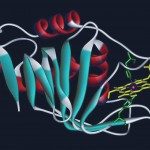Lien vers Pubmed [PMID] – 11232594
Antioxid. Redox Signal. 2000;2(1):137-42
Multiple lines of evidence indicate that oxidative stress is an integral component of the pathogenesis of Alzheimer disease (AD). The precipitating cause of such oxidative stress may be misregulated iron homeostasis because there are profound alterations in heme oxygenase-1 (HO-1), redox-active iron, and iron regulatory proteins. In this regard, HasA, a recently characterized bacterial protein involved in heme acquisition and iron metabolism, may also be important in the generation of reactive oxygen species (ROS) given its ability to bind heme and render iron available for free radical generation through the Fenton reaction. To study further the role of heme binding and iron metabolism in AD, we show an abnormal localization of anti-HasA to the neurofibrillary pathology of AD, but not in normal-appearing neurons in the brains of cases of AD or in age-matched controls. These results suggest the increased presence in AD of a HasA homologue or protein sharing a common epitope with HasA, which we term HasAh. We conclude that heme binding of HasAh is a potential source of free soluble iron and therefore toxic free radicals in AD and in aging. This furthers the evidence that redox-active iron and subsequent Fenton reaction generating reactive oxygen are critical factors in the pathogenesis of AD.
